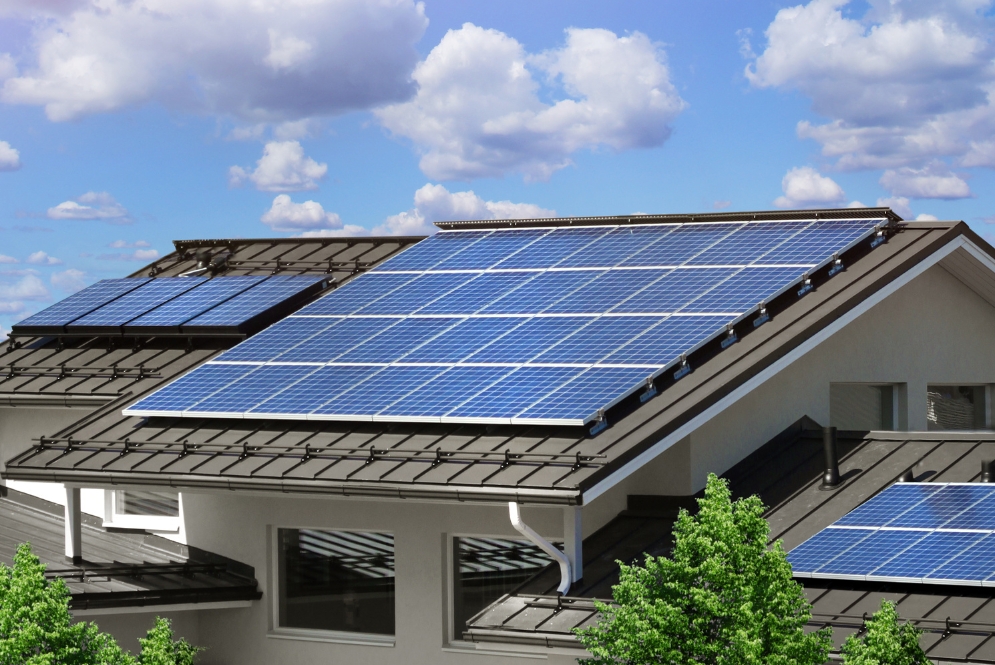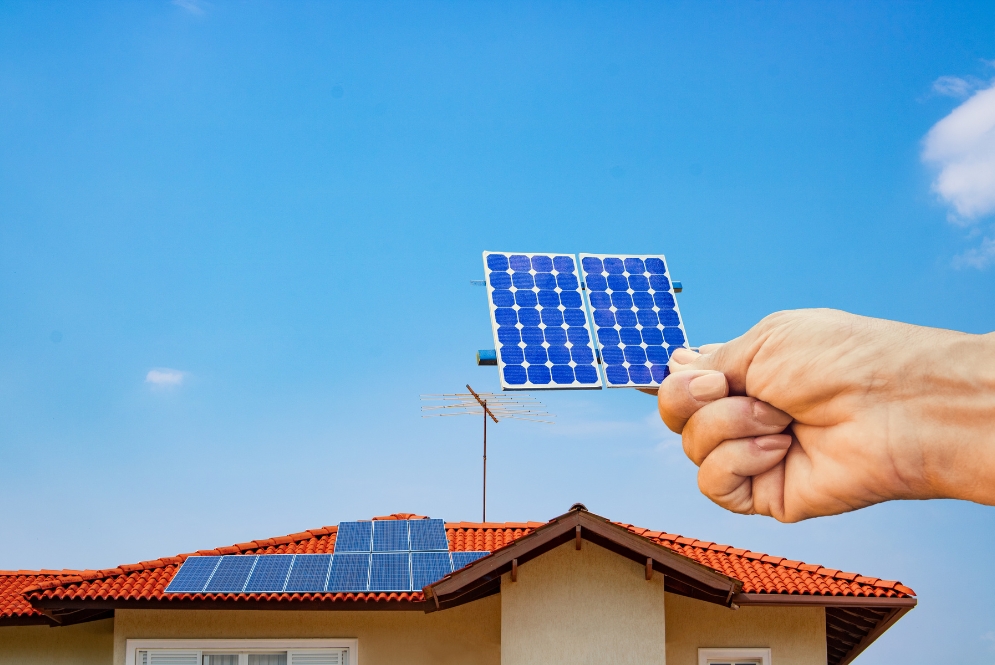Like many Aussies, we’re all on the lookout for ways to dial back our power bills and do a bit of good for the old environment. We’ve trodden that path ourselves and fully understand how daunting it can seem.
Through digging around, we’ve discovered that solar energy isn’t just a flash in the pan; it’s a solid choice for smashing those goals, especially considering Oz is blessed with some of the most intense solar radiation per square metre than any other place on Earth.
This yarn will walk you through everything from getting your head around solar energy to piecing together an efficient setup for your home or workplace. So let’s crack into it and figure out how we can tap into this clean source of power.
Key Takeaways
- Solar energy offers a clean and renewable source of power, reducing our reliance on fossil fuels and lowering greenhouse gas emissions. This move towards solar solutions helps combat climate change while ensuring a sustainable future.
- Installing solar panels at home or in the office can lead to significant savings on electricity bills. Over time, the initial investment pays off through reduced utility costs. Plus, various government incentives can make switching to solar even more financially viable.
- There are different types of solar systems available, including grid-tied, off-grid, hybrid, concentrated solar power (CSP), building-integrated photovoltaics (BIPV), and solar water heating systems. Choosing the right one depends on location, sun exposure, energy needs, budgetary constraints, quality, and warranty considerations.
- Proper installation and regular maintenance are essential for maximising the efficiency of your solar system. Positioning panels for optimal sun exposure and keeping them clean will ensure better performance and a longer lifespan.
- The future of solar energy is bright, with ongoing advancements in technology making systems more efficient and affordable. As we strive for increased efficiency through innovations like perovskite-silicon tandem photovoltaics, adopting solar power becomes an integral part of sustainable living practices, contributing significantly to environmental preservation efforts.
Understanding Solar Energy
Understanding solar energy is essential for harnessing its benefits. We explore the types of solar systems and factors to consider when opting for this sustainable energy solution.
Benefits of using solar energy
We harness the power of the sun to generate renewable energy, making solar panels a smart choice for both home and office owners.

Solar power systems tap into this clean energy source, reducing our reliance on fossil fuels and cutting down greenhouse gas emissions. This not only helps fight climate change but also ensures a sustainable future.
Installing solar panels in a home or office can lead to significant savings on electricity bills. Over time, the initial cost of photovoltaic systems is offset by the reduced utility expenses, making it a financially wise decision.
Moreover, advancements in photovoltaic technology and green technology are increasing efficiency and making solar energy more accessible than ever before.
Types of solar systems
After understanding the benefits of using solar energy, it’s important to explore the different types of solar systems available. Below, we detail the various options:
- Grid-Tied Solar Systems: These are connected to the local electrical grid and can feed excess power back into the grid.
- Off-Grid Solar Systems: Ideal for remote locations, these systems operate independently from the utility grid and require battery storage for electricity during low sunlight periods.
- Hybrid Solar Systems: Combining the best of both worlds, these systems work with or without a connection to the grid and include storage batteries for backup power.
- Concentrated Solar Power (CSP) Systems: Utilising mirrors or lenses to concentrate a large area of sunlight onto a small area, these systems convert solar energy into heat, which is then used to drive conventional steam turbines.
- Building-Integrated Photovoltaics (BIPV): These solar panels are integrated into building materials such as windows, roofing, or walls, offering an aesthetically pleasing and efficient solution.
- Solar Water Heating Systems: Designed to capture sunlight and use it to heat water for domestic use.
Factors to consider when choosing a solar system
After understanding the different types of solar systems, it’s crucial to consider several factors before selecting the right one for your home or office space. It’s essential to keep in mind the following aspects when choosing a solar system:
- Location and sun exposure: Determine the best location on your property for maximum sunlight exposure throughout the day.
- Energy needs: Calculate your average daily energy consumption to determine the size and type of solar system required.
- Budget and financing options: Consider your budget and explore various financing options, such as loans, leases, or power purchase agreements.
- Quality and warranty: Research reputable solar panel manufacturers and ensure they offer a substantial warranty on their products.
- Installation and maintenance: Find a reliable and experienced installer who can efficiently set up the system and provide regular maintenance services.
- Government incentives: Investigate available rebates, tax credits, and other financial incentives offered by local or state governments for installing solar energy systems.
Designing an Efficient Solar System
Designing an efficient solar system involves maximising sun exposure and selecting the right components. Proper installation and maintenance are crucial for ensuring the optimal performance of your solar energy solution.
Maximising sun exposure
To maximise sun exposure, position solar panels in a location with the most direct sunlight throughout the day. Regularly clean panels to ensure optimal light absorption and efficiency.
Additionally, trimming any surrounding trees or vegetation that may obstruct sunlight can improve overall energy generation.
Adjusting the tilt angle of solar panels according to seasonal changes can also optimise their performance. In addition to these tips, consider using solar tracking systems that automatically adjust panel angles to follow the sun’s path for maximum exposure throughout the day.
Selecting the right components
Select solar panels that offer high energy efficiency and durability, such as perovskite-silicon tandem photovoltaics.
Proper installation and maintenance
To ensure optimal performance of your solar system, it is essential to focus on proper installation and maintenance. Here are key factors to consider:
- Positioning the solar panels for maximum sun exposure is crucial for efficiency.
- Regularly cleaning the panels to remove dirt and debris will maintain their effectiveness.
- Checking the wiring and connections to ensure they are secure and free from damage is vital.
- Performing routine inspections to identify any potential issues early on can prevent larger problems down the line.
Achieving Energy Independence
Achieving energy independence involves reducing reliance on fossil fuels, which can result in significant cost-saving benefits and a positive impact on the environment. Discover how you can take charge of your energy needs with sustainable solar solutions!
Reducing reliance on fossil fuels
Reducing reliance on fossil fuels is essential for a sustainable future.
By transitioning to solar energy solutions, we can decrease our dependency on non-renewable resources such as coal and oil, reducing carbon emissions and mitigating environmental impact.
Embracing solar energy not only brings cost-saving benefits but also contributes to the global effort to create a cleaner and more resilient energy grid.

Achieving true energy independence means taking proactive steps towards adopting renewable solutions like solar power. As we explore the possibilities that come with reducing reliance on fossil fuels, it’s crucial to understand how this shift positively impacts both our lives and the environment.
Cost-saving benefits
Switching to solar energy can lead to substantial cost savings in the long run. By harnessing the power of the sun, you can significantly reduce or even eliminate your electricity bills, providing a stable and predictable energy cost for years to come.
Moreover, with various government incentives and rebates available for installing solar panels, the initial investment can be offset, making solar energy an economically viable option for sustainable power.
In addition to reducing reliance on traditional grid electricity, which is susceptible to price fluctuations due to market conditions and geopolitical factors such as changes in fuel prices and availability, opting for solar power provides stability in energy costs over time.
Potential impact on the environment
Switching to solar energy can have a positive impact on the environment by reducing carbon emissions and dependence on non-renewable resources. The use of solar power decreases air and water pollution, contributing to cleaner and healthier surroundings for our community.
Moreover, it helps conserve natural resources, which are essential for sustaining our ecosystem and preserving biodiversity.
As we consider the potential impact on the environment, embracing sustainable solutions will also pave the way for a more eco-friendly future with reduced environmental degradation and long-term benefits for generations to come.
The Future of Solar Energy
The future of solar energy involves continuous advancements in technology, potentially leading to increased efficiency and affordability. This sustainable energy source is expected to play a pivotal role in promoting environmentally friendly living practices.
Advancements in solar technology
Solar technology is advancing rapidly, with ongoing developments ensuring higher efficiency and lower costs for solar systems. Innovations in materials, such as perovskite-silicon tandem photovoltaics, are promising to increase the energy output of solar cells significantly.
Additionally, improvements in solar engineering principles are leading to more durable and long-lasting solar panels that require less maintenance over time.
These advancements hold great potential for homeowners and office owners looking to invest in sustainable energy solutions. As the solar industry continues to evolve, these innovations may offer increased affordability and accessibility for off-grid solar power systems.
Potential for increased efficiency
As advancements in solar technology continue to evolve, the potential for increased efficiency is becoming more attainable. With innovations such as off-grid solar power and perovskite-silicon tandem photovoltaics, there are exciting prospects for improving the energy output of solar systems.
Homeowners and office owners can look forward to greater energy production and savings with these cutting-edge technologies.
Furthermore, ongoing research into new materials and techniques for solar panel installation aims to enhance the overall performance of solar systems. By staying informed about these advancements, individuals can make informed decisions about their sustainable living choices while maximising the benefits of clean energy solutions.
Role in sustainable living
Solar energy plays a crucial role in sustainable living by reducing carbon emissions and decreasing dependence on non-renewable energy sources. By harnessing the power of the sun, solar systems provide a clean and renewable energy solution for homes and offices.
This not only helps to reduce our environmental impact but also contributes to creating a more sustainable future for generations to come. Embracing solar energy enables individuals and businesses to take an active part in preserving the planet while enjoying long-term cost savings and energy independence.
Additionally, adopting solar technology can lead to decreased reliance on traditional electricity grids, which further enhances sustainability efforts. It’s worth noting that advancements in solar technology continue to improve efficiency, making it an increasingly attractive option for achieving sustainable living goals.
Achieve Optimal Solar Energy Solutions
By harnessing the power of solar energy, we unlock a multitude of benefits for both our homes and the environment. By understanding solar energy and designing efficient systems, we pave the way towards achieving energy independence.
The future of solar energy holds immense promise with its technological advancements and potential for increased efficiency, playing a pivotal role in sustainable living. Contact us for further information on unlocking the full potential of solar energy solutions.


